
A review of the book “A Short Course in Digital Photography” by Barbara London and Jim Stone, Prentice Hall, ISBN-10: 0205645925, ISBN-13: 978-0205645923
Photographers, students, and teachers are always asking me for book recommendations on digital photography and for tips on improving their photography technique. Are you looking for such a book? Is this latest offering by authors Barbara London and Jim Stone, “A Short Course in Digital Photography” the best book for you too?
As a long time photography educator (college classes, workshops, seminars, magazine writing) I have used several other books from Prentice Hall by both Barbara London and Jim Stone. Notably, I’ve used the venerable “Photography (9th Edition)” which is a weighty, comprehensive (and expensive) volume, and the more moderate “A Short Course in Photography” both of which I am quite familiar with, and use for different classes.
When I received a copy of “A Short Course in Digital Photography” I was eager to see if it would fit the bill as an all around useful introduction to digital photography for newbies, as well as a good text for students, and also good for more experienced photo enthusiasts.
Skip to right to my RECOMMENDATION
The just published (February 2009) “A Short Course in Digital Photography” resembles its sister volume, “A Short Course in Photography” in size, shape, weight, and importantly, content. A quick scan of the new book shows that London and Stone followed the same format in creating this ‘digital photography’ version of the book series. The table of ‘Contents’ is sequenced the same, and contains many of the same things in the same order.
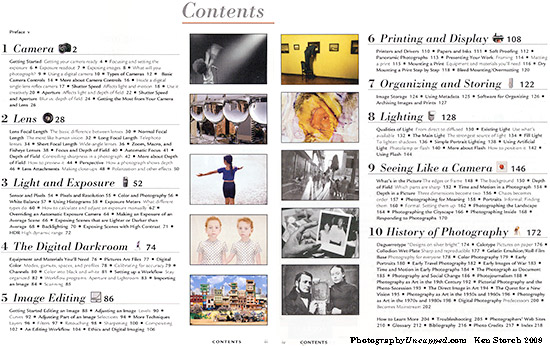
Not surprisingly then, the book uses many of the same illustrative graphics and photographs to show concepts and examples. This is a good thing since the quality of these elements is consistently high.

Most of the books purporting to be about ‘digital photography’ gloss right over the actual ‘photography’ (F Stops, Shutter Speeds, Depth of Field, Focus, Focal Length, Exposure, etc.) and skip right to Photoshop. This reflects the fact that many of the authors are from computer backgrounds, not from photography. Writing about digital photography primarily from the ‘Photoshop image editing’ side is like discussing conventional photography only on the ‘film developing’ aspects.
The authors of this book do a good job of balancing the core photographic information with image editing and image print output. I can’t say this about most books competing in this area.
I’ve been generally pleased with how the authors lay out the information, and with only minor exceptions, I usually agree with their sequencing as well.
Chapter 1 “Camera” begins with a ‘Getting Started’ section which is like a ‘quick start guide’ included to give the simple starting instructions for beginners. Handling of the camera, memory cards, and exposure are touched upon briefly, but effectively. The chapter goes on to cover the photographically essential concepts of how shutter speed and aperture work together.
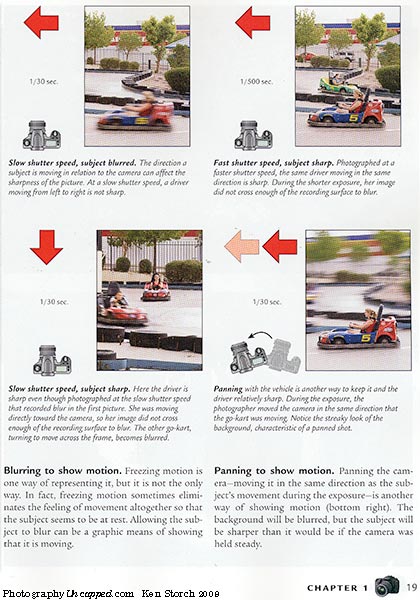
Chapter 2 “Lens” is a good overview of the topic of Lenses, Focal Length, Depth of Field, and Focus both manual and automatic. It differs very little from the non-digital version.
Chapter 3 ‘Light and Exposure’ of the “Digital” short course combines Chapters 3 + 4 of the non-digital version in an useful way replacing the ‘film’ sections and adding a brief look at Pixels, Resolution, and the all essential Histogram.
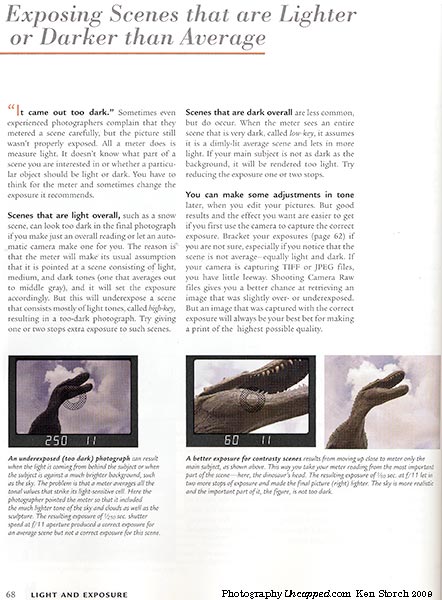
I disagree with some of the methods detailed in Chapter 5 “Image Editing” in the sense that I’d suggest alternative ways to do similar image edits in Photoshop. This is not a big deal though. If you get 5 photographers together, you’ll likely get 12 different methods for doing the same sort of thing anyway.
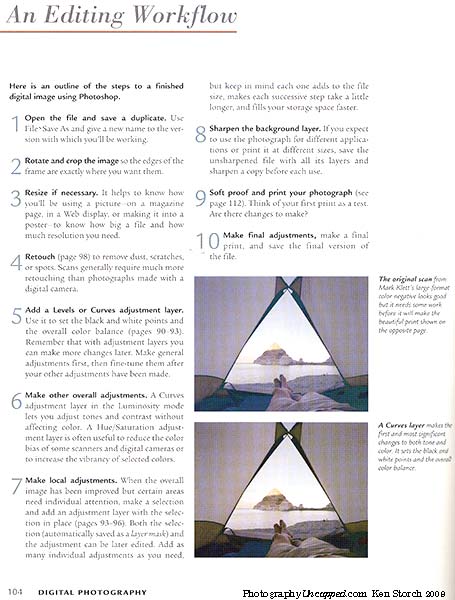
I do like that the book at least touches on the subject of ‘Ethics’.
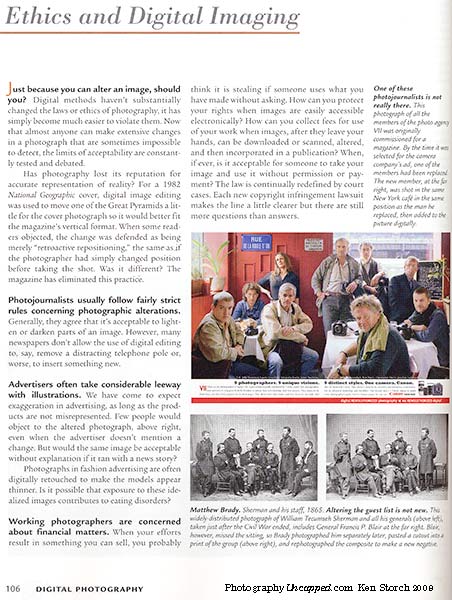
Most of the books’ methods and explanations are quite clear and easy to understand. Any differences I have are mostly quibbles, not serious disagreements.
Something that I like about all of the books in this series is that they cover the basics clearly but also have much for people to come back to as they learn more about the craft and art of photography.
RECOMMENDATION
“A Short Course in Digital Photography” does what I want such a book to do.
The Pluses:
- Good explanations
- Good illustrations
- Clear information
- Good sequencing and organization
- Moderate cost
- Room to learn and grow into
The Minuses:
- Much duplicate content with the non-digital “A Short Course in Photography”
- Minor quibbles about workflow and methods.
The Summation:
“A Short Course in Digital Photography” comes highly recommended for beginners, digital photography students, and photo enthusiasts looking to learn more. (If you already own a version of the non-digital “A Short Course in Photography” there is less of an incentive to get this one also.)
I am recommending this book to my friends, for student classes, and to other teachers.
Disclaimer: While I did receive a copy of this book from the publisher, Prentice Hall, I have no other connection to them, or to the authors Barbara London and Jim Stone. If you click through my links to Amazon and buy the book, my site gets a small bump for the referral.
I only recommend things on this site that I personally use, or have other personal experience with.
I like this book,
Ken Storch
A Short Course in Digital Photography
I have “A Short Course in Photography” and I really like it. I want to learn more about digital…do you think I should look into this book or something different? How much of the information is repetitive?
I think it’s a pretty good introductory volume on Digital Photography. It is comparable to the conventional Short Course on Photography. Since you know a lot of the photo basics, that makes it a bit less useful for you, Alyssa. Do you have the regular Short Course?
I have the regular Short Course and Photography by them. Any suggestions for something that deals more with the digital aspects of photography?
Since you already have the basics of general photography, are you more interested in the digital camera workings? or in the image processing (Photoshop)? or digital printing?
All of it 🙂 For now I’m really interested in digital camera workings. I have quite a few photoshop books but I’d always like to learn more. At the moment I don’t have photoshop so I just want to focus on learning more about my camera.
I’m looking through my digital photo book library, but haven’t found anything specific to your needs yet. I’ll let you know if/when I do. There’s a lot online of course. If you tell me some areas you want to learn up on, I’ll see if I can provide links.